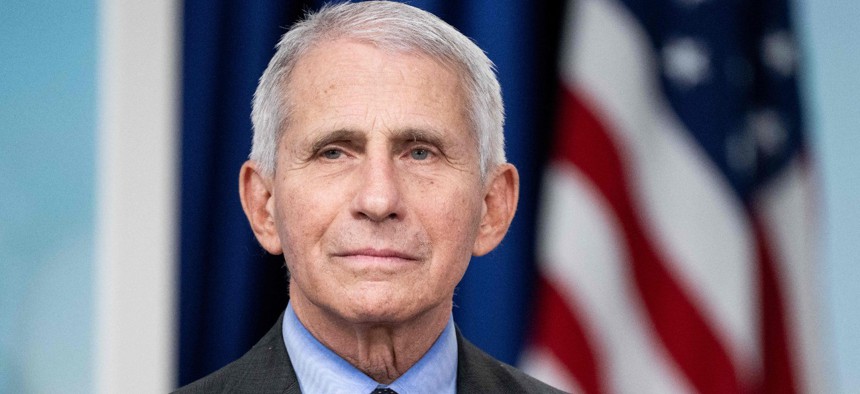
Dr. Anthony Fauci, former director of the National Institute of Allergy and Infectious Diseases, told the New York Times it is clear something went wrong with the U.S. pandemic response. SAUL LOEB/AFP via Getty Images
Coronavirus Roundup: Reflections on the Pandemic Response
There's a lot to keep track of. Here’s a list of this week’s news updates and stories you may have missed.
A group of 34 experts led by the former 9/11 Commission executive director is out with a new investigative report on lessons from the pandemic, as the public health emergency comes to an end in less than a month.
“The biggest prevention mistake was probably the failure to warn in time, release emergency funds that were already available…and then develop an adequate testing program,” said Philip Zelikow, professor of history at the University of Virginia and former 9/11 Commission executive director, on Washington Post Live. “It’s a cluster of choices that occurred probably beginning in about late January of 2020 up through the first couple of months of the crisis.”
The report says some “hard things” about the Centers for Disease Control and Prevention; however, “CDC wasn’t actually built or designed to make those kinds of choices” it had to during the pandemic, Zelikow said. “America doesn't really have a national public health agency with operational capabilities around the country that makes tradeoffs between loss of education, economic hardship and public health issues,” he continued. “[CDC] was thrust into a position of offering guidance that turned out to be unworkable and sometimes based on bad science, but the deeper problem is that we didn’t have institutions that were even built to make those decisions in the first place.”
Here are some of the other recent headlines you might have missed.
Dr. Anthony Fauci, former director of the National Institute of Allergy and Infectious Diseases, said in an extensive interview with The New York Times Magazine published this week that “something clearly went wrong” with the pandemic response. “And I don’t know exactly what it was,” he continued. “But the reason we know it went wrong is that we are the richest country in the world, and on a per-capita basis we’ve done worse than virtually all other countries. And there’s no reason that a rich country like ours has to have 1.1 million deaths.”
NIAID named Theodore Pierson, most recently a senior investigator and chief of NIAID’s Laboratory of Viral Diseases, as its new vaccine research center director. In his new role he “will lead a comprehensive research program focused on the design, development and testing of candidate vaccines and biologics against HIV/AIDS, coronaviruses, influenza and emerging infectious diseases with pandemic potential,” the agency said in a statement on Tuesday.
AmeriCorps and the Centers for Disease Control and Prevention announced on Tuesday they’ve awarded $90 million in second-round grants for the Public Health AmeriCorps, which is about to turn a year old. “This funding will support more than 4,000 AmeriCorps members who will add capacity to our strained public health systems and reduce barriers to care, while we also create career pathways for future public health leaders from all backgrounds,” AmeriCorps CEO Michael Smith said.
Janet McCabe, deputy administrator of the Environmental Protection Agency, said on an internal call on Thursday that agency officials don’t necessarily think everyone will be back in the office all together eventually, and they are considering the climate impacts of commuting, Bloomberg reported. Faisal Amin, EPA chief financial officer, said the agency’s performance during the pandemic was “comparable” to before and EPA supports broadly the employee union’s assertions that telework didn't hurt performance. EPA plans to award a contract to conduct a space planning analysis, so it can determine if it needs to shrink its building footprint.
Help us understand the situation better. Are you a federal employee, contractor or military member with information, concerns, etc. about how your agency is handling the coronavirus? Email us at newstips@govexec.com.







